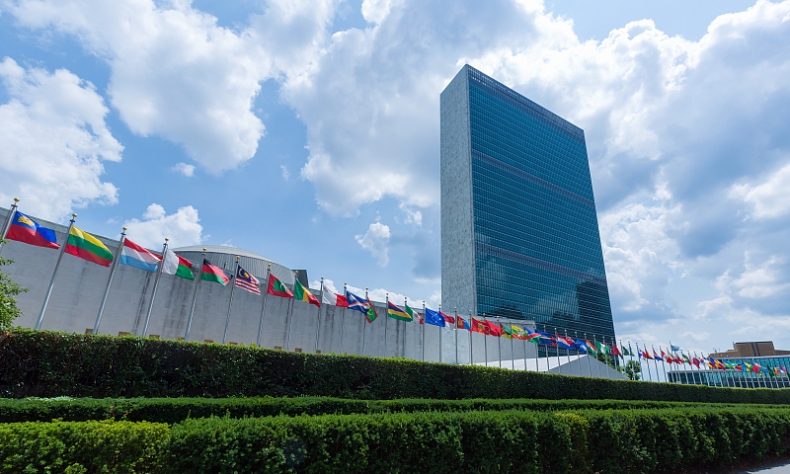
The UN at 75: Human Rights Contribution of Global South
The theory promotes ownership in two ways. First, it calls for a bigger involvement of the Global South and its representatives in the U.N. human rights framework. Second, there should also be more room for approaches valued in the Global South.
This year, we celebrate the 75th anniversary of the United Nations, providing a good opportunity to reflect on the issue of human rights.
The organization’s founding document, the Charter, contains several references to human rights. Thus, according to Article 1(3), promoting and encouraging respect for human rights and fundamental freedoms for all without distinction as to race, sex, language or religion is one of the purposes of the U.N. In 1948, this led to the General Assembly adopting the Universal Declaration of Human Rights.
This was the first step towards building a global human rights system and today it still serves as the solid foundation on which all subsequent instruments are based. It is true that a number of countries abstained during the vote, but their representatives had, nonetheless, been very active and supportive during the drafting process. Therefore, its adoption was a resounding success.
The drafters, who came from a great variety of ideological, philosophical and religious backgrounds, succeeded in agreeing on the text of a document. The secret of their success was that they were intent on drafting a document doing justice to every civilization and a worldview appealing to the widest audience possible. In this way, the Universal Declaration would become a people’s charter covering all human relations.
As later became apparent, the Chinese delegate, Zhang Pengchun, was one of the main architects of the Universal Declaration. He played a very important role in ensuring good personal relations between members of the Drafting Committee and he added some very important elements to the document. Thus, the Chinese notion of ren has been included as “conscience” and “brotherhood” in Article 1.
However, the success of the Universal Declaration was short-lived. During the Cold War, Northern countries and NGOs began to claim it was, in essence, a Northern document, because it was based on liberal values such as individualism, personal autonomy, secularism and rationality. They also argued that only the civil and political rights enumerated in the Declaration were “proper” human rights, while denying the importance of social and economic rights.
The reason for that was political: they were eager to turn their version of the Universal Declaration into a yardstick to show that other countries were not living up to their human rights obligations.
This was not what the drafters had in mind, of course. Human rights, as a concept, has been part and parcel of every civilization, including that of China, states in Africa, the Islamic countries and Latin America, making it part of the joint heritage of humanity and not the prerogative of a single group.
Fortunately, the period during which Northern actors can claim superiority in intentional human rights is ending. The main reason is that the Global South, led by China, is reclaiming ownership. China has hosted two very productive South-South Human Rights Forums during which a joint Southern approach emerged. China also brings together its Southern partners in the Human Rights Council, resulting in the adoption of two Chinese draft resolutions giving more emphasis on social and economic rights, such as the right to development.
Consequently, there is growing recognition of the fact that, since the reform and opening up program began, China has succeeded in lifting hundreds of millions of people out of poverty, which ranks among the greatest human rights achievements of all time.
Academics from the Global South set up a Cross-cultural Human Rights Network in Beijing in 2014, helping draw attention to human rights ideas and concepts coming from the Global South. The Network also publishes a distinguished journal, the Cross-cultural Human Rights Review, providing a podium to human rights scholars from the Global South, whose contributions are often ignored by the editors of journals based in the North.
In 2015, at the U.N. General Assembly, China launched the concept of “building a community with a shared future for all humanity” as a guiding principle for international order. This theory has great potential in the area of human rights through its promotion of diversity and ownership.
Such concept is based on harmony in diversity. It emphasizes that we should not only accept, but actually value, that countries have different backgrounds and therefore also different approaches to human rights. Sameness is not required, nor is it beneficial. As long as states live up to their international human rights obligations, how they do so is for them to decide. This approach is supported by the “big tent” idea underlying the Universal Declaration.
The theory promotes ownership in two ways. First, it calls for a bigger involvement of the Global South and its representatives in the U.N. human rights framework. Second, there should also be more room for approaches valued in the Global South.
Thus, many procedures within the U.N. human rights framework are legalistic and antagonistic, while in the Global South reconciliation and the exchange of best practices are deemed more suitable. If the U.N. human rights bodies succeed in adjusting their proceedings accordingly, they may expect even more support from Southern states.
Their increased involvement in the U.N. human rights system under China’s leadership during the past few years has given it a second lease of life. That is the best gift that could be presented to the U.N. for its 75th birthday.
Tom Zwart is professor of cross-cultural law, Utrecht University. He is also director of the Cross-cultural Human Rights Centre, Free University of Amsterdam, and winner of the 2020 Li Buyun Law Prize.
 Facebook
Facebook
 Twitter
Twitter
 Linkedin
Linkedin
 Google +
Google +










